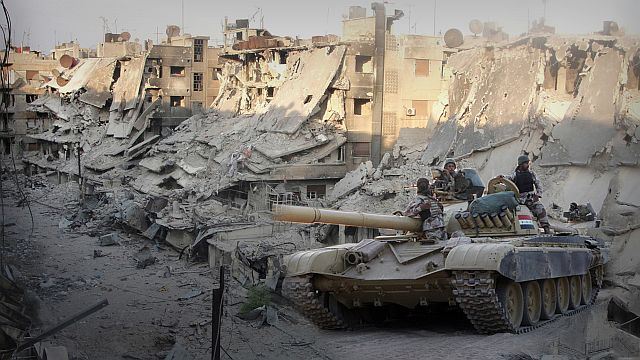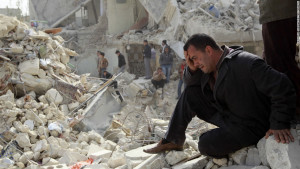
IN A recent editorial the Guardian argued that “when debating the Syrian war, it is important to discriminate between the various external state involvements.”
For the Guardian “Russia has a special responsibility” because it is “much more implicated — directly and indirectly — in the massacre of civilians.”
By arming Bashar al-Assad’s government and protecting him diplomatically, Russia certainly bears significant responsibility for the thousands of Syrians slaughtered by their government forces in air strikes, artillery bombardments, small arms fire and summary executions — all extensively documented by Amnesty International and Human Rights Watch.
However, as a British citizen I share responsibility for the actions of the British government and its allies. This is because I pay my taxes and, more importantly, have far more power to influence British government policy than I do the Russian government.
As the US dissident Noam Chomsky noted: “It’s a very simple ethical point: you are responsible for the predictable consequences of your actions — you’re not responsible for the predictable consequences of somebody else’s actions.”
The same logic, of course, should apply to British journalists and British newspapers.
So what have Britain and its allies been up to in Syria? Do we bear any responsibility for the ongoing war that has killed more than 220,000 people and forced over four million to flee the country?
According to Ian Black, the Guardian’s Middle East Editor, “Russia has supported Assad, while the US advocates a political transition to end his rule while backing armed opposition groups.”
Compare this subtle propaganda to a recent report — also in the Guardian — that noted Russia proposed a peace deal in February 2012 in which Assad would step down.
According to the person leading the negotiations, the former Finnish president and Nobel peace prize laureate Martti Ahtisaari, the US, Britain and France ignored this offer because they “were convinced that Assad would be thrown out of office in a few weeks.”
Hugh Roberts, the former director of the North Africa Project at the International Crisis Group, echoed Ahtisaari’s testimony in the London Review of Books in July 2015.
“The Western powers … sabotaged the efforts of the UN special envoys, Kofi Annan and then Lakhdar Brahimi, to broker a political compromise that would have ended the fighting,” Roberts wrote. “Western policy has been a disgrace and Britain’s contribution to it should be a matter of national shame.”
As Black mentions, isolated media reports have shown the US, often supported by Britain and working with Turkey and many of the Gulf monarchies, has been helping to arm and train the Syrian rebels since summer 2012.
For example, in September 2013 the New York Times explained: “Saudi Arabia, quietly co-operating with American and British intelligence and other Arab governments, has modestly increased deliveries of weapons to rebels fighting in southern Syria”.
This was done covertly, Syrian rebel groups told the New York Times, because US and British intelligence did not want their support publicly known.
Moreover, the West has been arming the rebels in the full knowledge that the insurgency was increasingly dominated by extremist groups.
After “extensive interviews with Syria policymakers from the Obama administration” McClatchy’s Hannah Allam recently noted Barack Obama’s government “was warned early on that al-Qaida-linked fighters were gaining prominence within the anti-Assad struggle.” Similarly a recently released formerly classified US Defence Intelligence Agency (DIA) report noted that from at least August 2012 the West knew “the Salafists, the Muslim Brotherhood, and AQI [al-Qaida in Iraq]” were “the major forces driving the insurgency in Syria.”
US support for “the crazies” in Syria was confirmed by General Michael T Flynn, the director of the DIA from 2012-14, in an interview with journalist Mehdi Hasan on Al-Jazeera in July 2015.
By 2013 an analyst with the private intelligence firm Stratfor had already concluded that “the current level of external intervention in Syria is similar to the level exercised against the Soviet Union and its communist proxies following the Soviet intervention in Afghanistan.”
Two years later in June 2015 the Washington Post was quoting US officials as saying “the CIA has trained and equipped nearly 10,000 fighters sent into Syria over the past several years.”
These inconvenient facts are presumably why, in April 2015, Peter Ford — a former UK ambassador to Syria — argued “we are … arsonists, causing the situation to deteriorate by indirectly giving succour and encouragement to the Islamists.”
Not that you would know all of this from reading British newspapers. Other than a few honourable exceptions, journalists have repeatedly downplayed the scale of Western intervention in Syria.
A Guardian editorial earlier this month referred in passing to “the refusal [of the West] to intervene against Bashar al-Assad,” while in August 2015 the Guardian’s foreign affairs commentator Natalie Nougayrede chastised Obama because he had “refrained from getting involved in Syria.” In the US Matt Schiavenza wrote an article in the Atlantic magazine titled Why The US Can’t Build An Opposition Army in Syria which, incredibly, failed to mention the 10,000 rebels the US claims to have armed. Over at the Brookings Institution Shadi Hamid argues the US has been “opting to remain disengaged in Syria.” How, I wonder, would these commentators describe a foreign power arming and training thousands of rebels intent on overthrowing the British or US governments?
Contrary to the actual actions of the West in Syria, much of the reporting and analysis of the mainstream press has presented a false narrative of Western inaction and benevolence. This blackout imposed on reality raises huge questions about the quality and purpose of our so-called free and rambunctious media, our democracy and our foreign policy.
How, for example, is the general public supposed to understand our own role in exacerbating the refugee crisis if they are not aware of it? As David Yelland, the former editor of the Sun, once said: “People attack papers for what they print. But what they don’t print is often the bigger story.”
source
.

More Stories
Navalny’s death used to hide western failures in Ukraine and their support for Israel’s genocide
Gifts from Gaza
Vulture capital circles over the corpse of Ukraine…